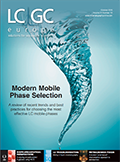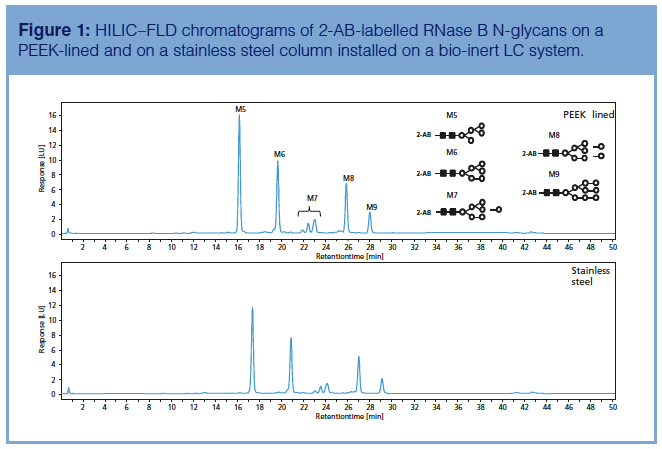SCM-9
The 9th SCM symposia (SCM-9) will take place from 30 January to 1 February 2019, in Amsterdam, The Netherlands.
The 9th SCM symposia (SCM-9) will take place from 30 January to 1 February 2019, in Amsterdam, The Netherlands. Focusing on the Separation and Characterization of natural and synthetic Macromolecules, SCM is the place where academia (represented by the International Scientific Committee) is challenged by industry (represented by an Industrial Advisory Board) to help solve real problems using analytical tools.
Many different classes of high-molecular-weight analytes will be discussed, with synthetic polymers receiving a great deal of attention. Similarly the analytical challenges posed by natural polymers, such as polysaccharides, will feature, forming a bridge to biopolymers, including proteins. For all these polymers, liquid chromatography (LC), field-flow fractionation (FFF), and lightâscattering (LS) are important characterization methods. Special methods, such as hydrodynamic chromatography and comprehensive two-dimensional liquid chromatography (2D-LC), will be discussed in detail. There will be ample attention for recent developments in mass spectrometry (MS) and ion-mobility spectrometry (IMS) and in nuclear magnetic resonance (NMR) spectroscopy.
SCM-9 features 78 exciting lectures in various formats, including invited keynotes, state-of-the-art overviews, and tutorials by leading specialists. The other half are submitted oral presentations, mainly from young scientists. The leading suppliers of instruments and consumables will be present at SCM-9 to demonstrate and discuss their latest innovations. Abstracts for poster presentations can still be submitted. All posters will be on display throughout the meeting to maximize scientific interaction. A special session will be devoted to synergies between poster presentations and the exhibition.
For everyone who wants to learn more about the key separation techniques, two one-day short courses will be organized prior to the meeting. On Monday 28 January 2019, Kim Williams (Colorado School of Mines, Colorado, USA) and Myeong Hee Moon (Yonsei University, Korea) will discuss all the ins and outs of FFF, a technique that has seen considerable growth in recent years. Different FFF techniques (flow-FFF, sedimentation FFF, thermal FFF) will be discussed, with special emphasis on case studies, method development, and troubleshooting. On Tuesday 29 January, Taihyun Chang (Pohang University, Korea) and Harald Pasch (Stellenbosch, South Africa) will share their immense knowledge on polymer separations with course participants. Size-exclusion chromatography (SEC) and various modes of interaction LC will be explained, culminating in 2D separations. Applications to various types of polymers will be discussed.
SCM-9 is the ideal platform for industrial scientists to catch up with the latest developments in the field and to meet the most exciting new talents; for academic researchers to meet each other, share ideas, and results; for students to discuss their work with academic and industrial experts; and for instrumentation experts to meet hundreds of scientists and to make connections between their own innovations and the latest scientific developments.
There are plenty of opportunities for young scientists, including oral presentations, posters, and poster pitches. They compete for several awards, including the best poster award and the SCM award. Based on the abstracts submitted for oral presentation, the SCM Committees have selected Jessica Desport from the Luxembourg Institute of Science and Technology in Belvaux (Luxembourg) to present the Young Scientist Award Lecture in the opening plenary session. Jessica’s subject, “Taming the mass spectrometry of high-molar-mass polydisperse polymer blends”, very much fits in with the main themes of the conference.
There will also be an exciting social programme culminating in a conference party in true SCM style.
Abstracts for scheduled poster presentations are invited until 15 December 2018, but last-minute posters may still be accommodated after this date. For further information see: www.scm-9.nl or e-mail: info@scm-9.nl

Characterizing Plant Polysaccharides Using Size-Exclusion Chromatography
April 4th 2025With green chemistry becoming more standardized, Leena Pitkänen of Aalto University analyzed how useful size-exclusion chromatography (SEC) and asymmetric flow field-flow fractionation (AF4) could be in characterizing plant polysaccharides.
Investigating the Protective Effects of Frankincense Oil on Wound Healing with GC–MS
April 2nd 2025Frankincense essential oil is known for its anti-inflammatory, antioxidant, and therapeutic properties. A recent study investigated the protective effects of the oil in an excision wound model in rats, focusing on oxidative stress reduction, inflammatory cytokine modulation, and caspase-3 regulation; chemical composition of the oil was analyzed using gas chromatography–mass spectrometry (GC–MS).









